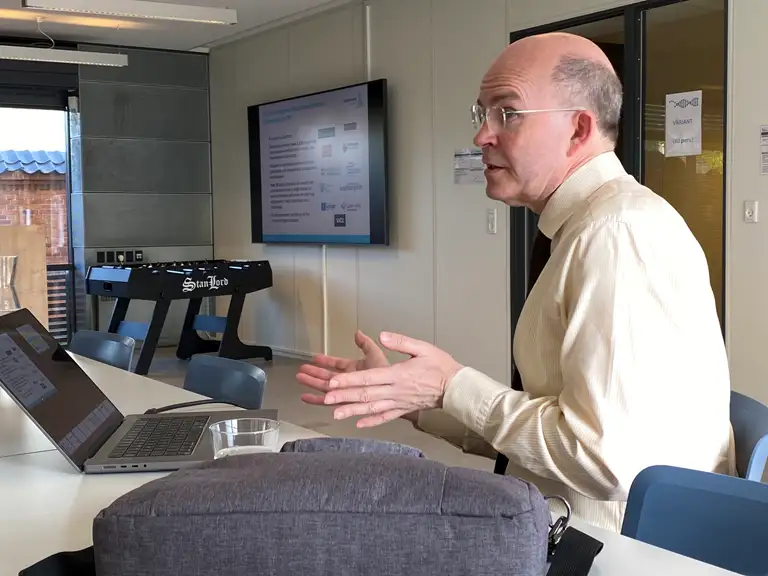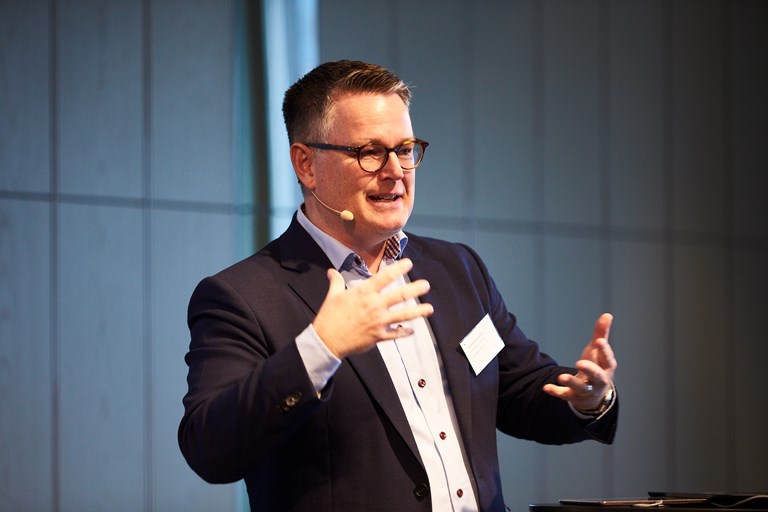Thursday and Friday this week, the international advisory board of the Danish National Genome Center (DNGC) is gathered in Copenhagen to discuss the latest developments in the field.
Data sharing is key to better and more effective interpretation
Tim Hubbard, Professor of Bioinformatics at King's College London, Head of Genome Analysis at Genomics England, chairs the Danish National Genome Center’s (DNGC) International Advisory Board.
In England, there is a strong focus on personalised medicine in their national strategy 'The future of healthcare' (September 2020). Here the importance of knowledge sharing and cooperation across national borders is emphasised.
”Our ability to interpret individual genomes for personalised medical care is very limited. The most likely way to improve this is through analysis of data from far more patients, so international collaboration is crucial to accelerate this. International analysis can be carried out by federation, ensuring sensitive medical data is analysed in place and need not move across national boundaries, helping to protect patient privacy”, says Tim Hubbard, Genomics England.
 On the occasion of the meeting with the international advisory board, Tim Hubbard gives a presentation to the Danish National Genome Center’s employees about this history and development of Genomics England.
On the occasion of the meeting with the international advisory board, Tim Hubbard gives a presentation to the Danish National Genome Center’s employees about this history and development of Genomics England.
National solutions require collaboration across stakeholders
In Sweden, the course has also been set towards the development of personalised medicine. Genomic Medicine Sweden (GMS) is the Swedish national infrastructure in genomic-based precision medicine aimed at ensuring that patients in Sweden have equal access to cost-effective genetic analysis to facilitate improved diagnostics and thereby more personalised care, treatment and prevention. Richard Rosenquist Brandell, Director of Genomic Medicine Sweden, is vice-chair of the International Advisory Board. He believes that precision medicine is a paradigm shift and a true modernization of healthcare with great potential for the future.
”We need to act on all levels, regional-national-international, and involve all stakeholders, healthcare, academia, patients, industry and authorities, to make this transition happen. As data sharing is key to precision medicine – no data, no precision medicine – international collaboration is crucial, such as within the 1+ Million Genome project”, says Richard Rosenquist Brandell.
Richard Rosenquist Brandell tells that in Sweden, the profession (e.g. health profession) they took the initiative to build competence networks and common infrastructure to enable equal access to precision medicine across the country.
”To this purpose, we combined the technological strengths of the national infrastructure for life science, SciLifeLab, and Genomic Medicine Sweden, a coordinating infrastructure for precision medicine that was started 5 years ago. In this way, we have been able to rapidly transfer genomic testing into clinical utility for patients with rare diseases, cancer and infectious diseases”, says Richard Rosenquist Brandell.
 Richard gave a presentation at the Annual Meeting for Personalised Medicine 2021 on Genomic Medicine Sweden (GMS) – strategies and focus areas
Richard gave a presentation at the Annual Meeting for Personalised Medicine 2021 on Genomic Medicine Sweden (GMS) – strategies and focus areas
Denmark and Sweden have many similarities across our respective healthcare systems. However, our approach to implement personalized medicine in the healthcare system has been different, and it is important to learn from one another. The Danish government was early to publish a national strategy on precision medicine. Afterwards, we have acted systematically to enable genomic medicine for instance by legislative changes and initiating the Danish National Genome Center. Richard Rosenquist Brandell continues:
”In this way, they [DNGC] have successfully implemented clinical whole-genome sequencing for patients with rare diseases and cancer with equal access across the country. From a Swedish perspective, we have everything to learn from this strategic work from the highest level to realize precision medicine for the benefit of patients and society at large.”
We learn from each other
In Denmark, we can learn a lot from England, Sweden and other countries. Germany, Canada, Norway, Finland, France and USA are all represented in the international advisory board. International collaboration is crucial when developing and facilitating personalised medicine in clinical as well as research settings.
That is why we are gathered at DNGC these days - to exchange experiences and knowledge on the development of personalised medicine.
Læs mere
International Advisory Board
Genomic Medicine Sweden and Danish National Genome Center in partnership to advance precision medicine